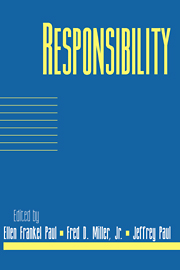Book contents
- Frontmatter
- Contents
- Introduction
- Acknowledgments
- Contributors
- Causation and Responsibility
- Negligence
- Responsibility and Consent: The Libertarian's Problems with Freedom of Contract
- The Irrelevance of Responsibility
- On Responsibility in Science and Law
- Responsibility and the Abuse Excuse
- Why Citizens Should Vote: A Causal Responsibility Approach
- Institutionally Divided Moral Responsibility
- Fate, Fatalism, and Agency in Stoicism
- Ultimate Responsibility and Dumb Luck
- Taking Responsibility for Our Emotions
- Index
Institutionally Divided Moral Responsibility
Published online by Cambridge University Press: 06 January 2010
- Frontmatter
- Contents
- Introduction
- Acknowledgments
- Contributors
- Causation and Responsibility
- Negligence
- Responsibility and Consent: The Libertarian's Problems with Freedom of Contract
- The Irrelevance of Responsibility
- On Responsibility in Science and Law
- Responsibility and the Abuse Excuse
- Why Citizens Should Vote: A Causal Responsibility Approach
- Institutionally Divided Moral Responsibility
- Fate, Fatalism, and Agency in Stoicism
- Ultimate Responsibility and Dumb Luck
- Taking Responsibility for Our Emotions
- Index
Summary
the notion of forward-looking moral responsibility
I am going to be discussing a mode of moral responsibility that anglo-phone philosophers have largely neglected. It is a type of responsibility that looks to the future rather than the past. Because this forward-looking moral responsibility is relatively unfamiliar in the lexicon of analytic philosophy, many of my locutions will initially strike many readers as odd. As a matter of everyday speech, however, the notion of forward-looking moral responsibility is perfectly familiar. Today, for instance, I said I would be responsible for watching my nieces while they swam. Neglecting this responsibility would have been a moral fault. When people marry, they undertake responsibilities, of moral import, of fidelity and mutual support. When people have children, they accrue moral responsibilities to feed, rear, and educate them. Not all forward-looking responsibilities are moral. While finishing this essay, I have had to keep an eye on a number of my administrative responsibilities, and, while reading it, you may well be occasionally distracted by some of your own. The notion of a responsibility that we accrue or take on, to look out for some range of concerns over some range of the future, is, then, perfectly familiar. Because this common notion of forward-looking responsibility has not been integrated into recent moral theory, however, my philosophical discussion of it will initially seem strange.
- Type
- Chapter
- Information
- Responsibility , pp. 218 - 249Publisher: Cambridge University PressPrint publication year: 1999
- 11
- Cited by

